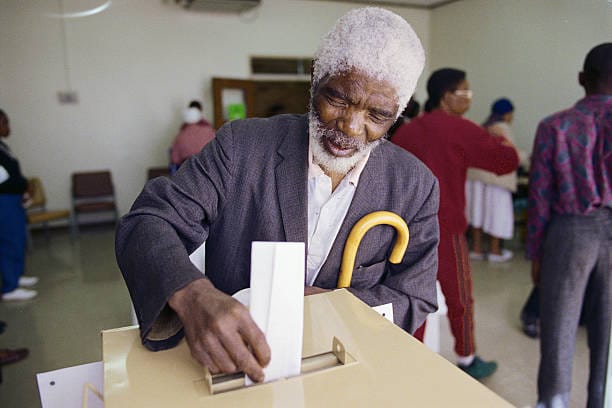JOHANNESBURG, South Africa — South Africans began voting on Wednesday in what is considered their most critical election in 30 years, a vote that could push their young democracy into uncharted territory.
The election puts at stake the African National Congress (ANC)’s three-decade dominance. The party, which led South Africa out of apartheid’s brutal white minority rule in 1994, is now facing discontent from a new generation in a country of 62 million people, half of whom are estimated to live in poverty.
Despite being Africa’s most advanced economy, South Africa grapples with severe socioeconomic issues, including one of the world’s highest unemployment rates at 32%. The persistent inequality, with poverty and joblessness disproportionately affecting the Black majority, threatens to unseat the party that once promised a better life for all by dismantling apartheid.
The ANC, which has won six successive national elections, currently sees its support dipping below 50% in several polls. This unprecedented decline suggests the party might lose its majority in Parliament for the first time, although it is still expected to hold the most seats. In the last national election in 2019, the ANC won 57.5% of the vote, marking its worst result to date.
President Cyril Ramaphosa, the ANC leader, has pledged to “do better,” asking for more time and patience from the electorate. A loss of majority would mean the ANC might have to form a coalition to remain in government and keep Ramaphosa as president, an unprecedented scenario.
Nearly 28 million people are registered to vote at more than 23,000 polling stations across South Africa’s nine provinces. The final results are expected by Sunday. Ramaphosa is set to cast his vote in Soweto, Johannesburg, where he was born and which was once the epicenter of the resistance to apartheid.
The opposition in this election is diverse but fragmented. The two largest opposition parties, the Democratic Alliance (DA) and the Economic Freedom Fighters (EFF), are not expected to gain enough votes to surpass the ANC. Disenchanted voters are turning to a wide array of over 50 opposition parties, many of them new. Notably, one of these new parties is led by South Africa’s former president, who seeks retribution against his former ANC colleagues.
Despite the challenges, the ANC remains confident of retaining its majority. Ramaphosa has highlighted South Africa’s progress since apartheid, emphasizing the improved rights and freedoms for Black South Africans. However, memories of apartheid and the historic 1994 vote that ended it are fading with time.
“This will be the seventh time that South Africans of all races, from all walks of life, from all corners of our country, will go to vote for national and provincial government,” Ramaphosa said in his final speech before the election. “We will once again assert the fundamental principle … that no government can justly claim authority unless it is based on the will of all the people.”
Ramaphosa outlined his government’s policies to boost the economy, create jobs, and extend social support for the poor. His speech drew criticism from opposition parties, accusing him of violating electoral law by using his office to promote the ANC.
The vote will highlight South Africa’s stark contrasts, from Johannesburg’s economic hub to Cape Town’s tourist allure, and the informal settlements surrounding both cities. Millions will vote in rural areas, considered ANC strongholds. Analysts suggest the ANC might still retain its majority due to its deep experience in governance and effective grassroots campaigning.
While 80% of South Africans are Black, the country is multiracial, with significant populations of white people, those of Indian descent, and those with biracial heritage. There are 12 official languages. This diversity, celebrated by Nelson Mandela as a “Rainbow Nation,” might now be reflected in its politics with the emergence of many new opposition parties.
https://www.africanexponent.com/voting-in-south-africa-is-underway-as-her-young-democracy-is-put-to-huge-test/


